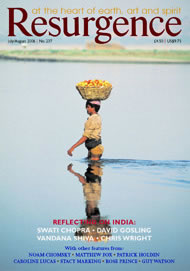THE WILD BRAID is an extraordinary portrait of the artist at work, in this case the 100-year-old poet Stanley Kunitz. Though his subjects are gardens and poetry and the way they influence each other, Kunitz illuminates the rhythms of crafting anything, whether it’s a garden or a poem, a piece of music or a chair.
The Wild Braid offers a series of literal and metaphoric conversations – between Kunitz and his collaborators, photographer Marnie Crawford Samuelson and poet Genine Lentine; between the garden and the poem; between language and photographs. It is a beautifully designed volume which includes poems, prose and photographs. Although contemporary culture gives us very few images of the elderly as beautiful, the pictures of Kunitz attending to his garden are clearly filled with beauty.
Kunitz, a much-honoured poet based in New York and Cape Cod, is the author of more than nineteen books. That he is writing and gardening at one hundred is marvellous in itself, but his reflections on both activities are pure, practical, and exquisitely expressed. It is a great gift to read the words of someone whose long commitment to poetry gives him a language simple and subtle enough to speak directly of life and death, suffering, renewal and beauty.
Gardening offers many metaphors for making poems, and tending a poem has many parallels with cultivating a garden. It’s not that either illustrates or explains the other, but that each offers a meeting of art and nature. The terraces of the garden become the stanzas of a poem, and the poem becomes a garden filled with the secret sources of life’s energy.
The metaphor is never simply an equation. The garden is multiple, like language, with interpenetrating layers of visible and invisible beauty, weaving together form and energy, history and presence. “The universe is a continuous web | Touch it at any point and the whole web quivers.” We both lose and find ourselves in the garden and in poems, and each encourages us to enlarge our vision, “to feel that one’s family extends across the borders of the species and belongs to everything that lives”.
Kunitz notes that the garden reflects the viewer’s own state of being at the time much as our responses to a poem reveal our own preoccupations. “The garden communicates what it shows to you but you also contribute to the garden some of what you are seeking in terms of your own life … One reason a garden can speak to you is that it is both its own reality and a manifestation of the inner life of the mind that imagined it in the beginning.”
Thoreau once wrote about having two notebooks, one for poetry, one for facts, and wanting to put them together into a single book; one could consider The Wild Braid to be a descendant of Thoreau’s single notebook of wonders. It is an open secret that the spirit of wonder informs both poetry and biology; that ecology is a science of beauty. In Kunitz’s poems attention leads to awe. In his prose, the raccoons, owls and snakes, the spruce and the juniper share the page with memories of childhood sorrow and of reading Hopkins, with reflections on ageing and on the sensuality of language. Observations of the intimate details of the garden open out into a reverent celebration of the abundance of the natural world. Kunitz’s deep respect for the movements of the soul and the power of desire and death is communicated simply and powerfully. His ability to join the inner wilderness to the world around us in an exquisite radiant whole is the culmination of a long life of faithful attention.
Kunitz acknowledges the generosity that underlines true creativity, that work is “the deepest manifestation of your gratitude for the gift of life”. Moved by Kunitz’s generosity, I find myself wanting to give his book to many people in my life: the gardeners and poets, yes, but also to a carpenter, a musician, a healer, a computer expert.
Even though the passages and poems are brief, The Wild Braid is not a book that can be read quickly. It is a book that is layered with wisdom, and that offers nourishment, sometimes like barley soup, sometimes more like honey cake, every time I return to it. Many years ago I had a dream in which my books turned into flowers, and certainly The Wild Braid is a magnificent flowering of a book, rooted inthe life and work of great human.
Former US Poet Laureate and Pulitzer Prize winner, Stanley Kunitz died, aged 100, in May 2006.
J. Ruth Gendler is author of The Book of Qualities and editor of Changing Light: The Eternal Cycle of Night and Day.






